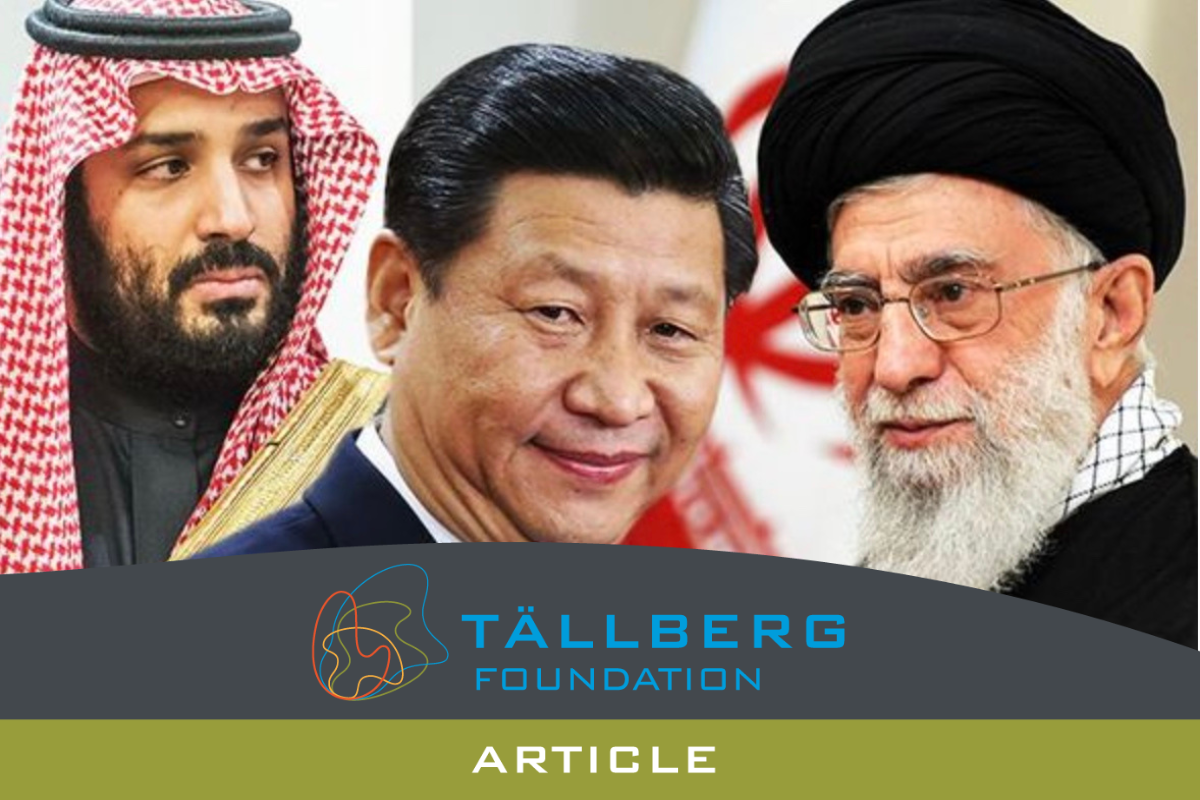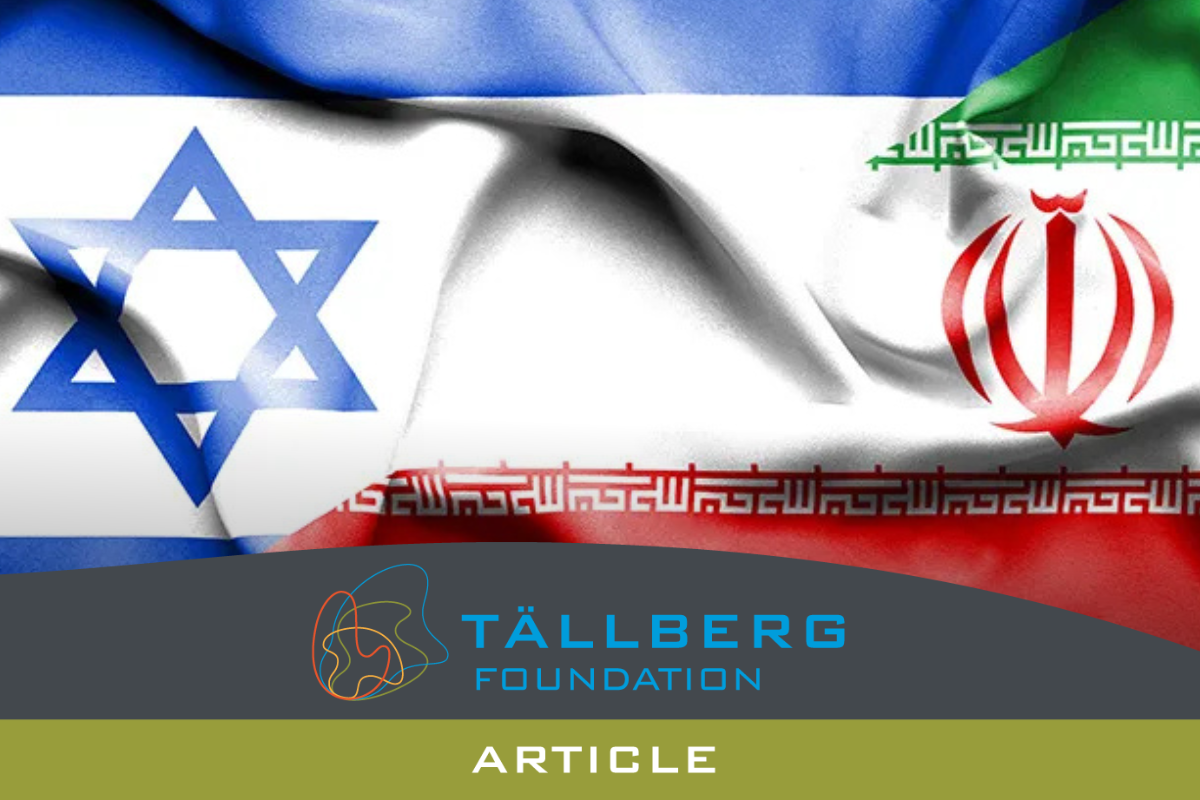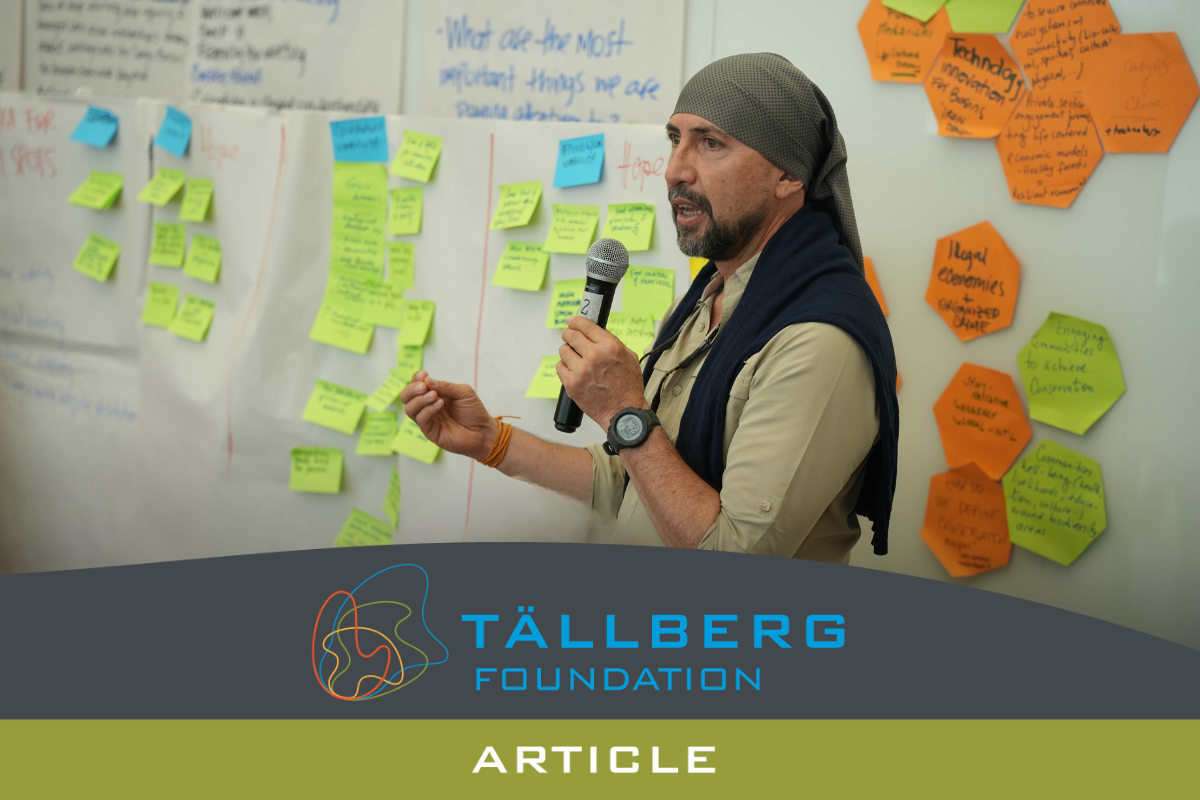We live in a bipolar world: United States and Europe on one side; China and Russia on the other. And everyone else is expected to choose one or the other. But what if a significant country—say, Saudi Arabia—refuses? Or decides that it has spent too long on one side, and would like to try something different?
“There is a gap of perception to what a strategic partnership means to Riyadh and what it means to Washington,” said Yasmine Farouk, an expert on Saudi foreign policy and more broadly the Gulf. In a recent New Thinking for a New World podcast, she observed that Saudi Arabia’s perception is that “diversifying their international relations is not a zero-sum game. Having closer relationships with China and Russia doesn’t mean a less close relationship with Washington. They think they can have both,” even though Saudi Arabia has been one of America’s closest Arab allies since Franklin Roosevelt left the Yalta conference to meet with King Ibn Saud.
In the staid, slowly changing world of global diplomacy, Farouk’s description of Saudi thinking ranks somewhere between heresy and fantasy. Yet, on March 10, the world witnessed the Saudi and Iranian foreign ministers announcing the resumption of diplomatic relations after years when they were far closer to war than to peace—at a press conference in Beijing, not Washington, hosted by the Chinese, not the U.S., foreign minister.
Oops!
As Farouk tells the story, this is realpolitik. On the one hand, she argues that since November 2022 the Saudis had aggressively encouraged “Iran’s domestic protests and domestic instability.” They promoted international coverage of the protests and provided news and other reporting inside Iran that fed the opposition to the government. According to Farouk, “This is what got the Iranian regime to say, “Okay, this is getting serious. We need to find a compromise with these guys.”
On the other hand, Saudi Crown Prince Mohammed bin Salman—who is likely soon to be king—has bet everything on a profound economic, social, and cultural transformation of his country that he calls Vision 2030. Yet, “every time Iran attacked Saudi Arabia, whether in the waters of the Gulf or in Iraq or in Yemen, that was a setback that threatened the achievements of Vision 2030—hence threatening his (MBS) own legacy.”
Farouk’s conclusion? “Both of them needed stability…The difference this time is that it has always been Iran that had the cards to destabilize the Saudi regime. This time the Saudis also held cards.”
The obvious question is, why did it take the Chinese to close the deal? Farouk argues that, “The perception on the Saudi side is that China is uniquely placed to have leverage over the Iranians as their number one trade partner, their number one military partner, and their economic partner in general. They have the tools to put pressure on Iran and to make the Iranians think twice before breaching any kind of agreement where China is involved.” Not only did the Americans lack such leverage, they and the Europeans clearly were more interested in Iran’s nuclear potential than in Saudi Arabia’s need to reduce its own risk of conflict with Iran. “They—the Saudis—need a [Great] power to compensate for their weakness vis-a-vis Iran…but the United States and Western Europe never wanted to play that role.”
“Then enters the Chinese. The Chinese president when he was visiting Saudi Arabia last summer…told the Saudis, “We are going to invest our prestige, our political and our economic weight with Iran, to solve your problems.” Essentially, Farouk believes that the Chinese essentially said, “let’s make this about Saudi Arabia and Iran, not about global security, not about China, not about Gulf security in general.” And this is how they got buy-in from both parties.”
Beyond that, China’s strongly held view that no country has a right to judge others’ internal policies—in contrast to American and European insistence on universal human rights—is attractive to both Iran and Saudi Arabia as well as many countries in the Global South who are tired of Western judgements and interference. And all three countries—China, Saudi Arabia, and Iran—see their negotiation as proof that “peaceful resolution of disputes doesn’t always have to have to go through” the traditional powers and processes.
The result could be fabulous for the Saudis. As Farouk says, “If it really works, it solves Saudi Arabia’s national security priorities by having Iran stop its weapons supply to the rebels in Yemen who have been attacking Saudi Arabia. It takes away Iran’s instigation of attacks by militias in Iraq against Saudi Arabia. It may lead to some kind of coexistence in Syria and Lebanon.” All of that would enhance Saudi security, as well as influence.
But the piper always gets paid. What might the Chinese want beyond the dramatic visuals of replacing the Americans as the arbiter of Middle Eastern geopolitics?Farouk demurs: “You can never guarantee what kind of price tag China is going to put on the role it played for Saudi Arabia.” But she speculates that it might be to support some kind of Chinese military presence in the region (amidst widespread speculation that the Chinese are already building a military base in the United Arab Emirates) or Saudi support for the Chinese in the United Nations. In what is almost certainly an understatement, Farouk says that balancing the Chinese and the Americans “might become complicated.”
“Complicated” is a good word. There are at least two huge complications lurking not very far offstage. One is Israel, locked in what seems to be an existential confrontation with the Islamic regime in Teheran. The other is Iran’s nuclear ambitions where even public speculation imagines that the country is within months of being able to produce nuclear weapons.
Regarding the former, Farouk thinks that the Iran-Saudi deal could be perceived as a Saudi way to find a safe space in case there is a military escalation between Iran and Israel or between Iran and the United States. “A way to say, ‘We’re not part of this. We don’t want to be part of this, and we won’t be part of this.”
Regarding the latter—Iran producing nuclear weapons—Farouk is clear, “If Iran manages to have a nuclear weapon, the Saudi reaction would be to have one as well.”
Unfortunately, that sounds more like everything old is new again than like new thinking for a new world.
Do you think that China can do a better job in helping the Middle East achieve peace than the United States? Tell us what you think in the comments section below.
ABOUT OUR GUEST
 Yasmine Farouk is a nonresident scholar in the Middle East Program at the Carnegie Endowment for International Peace.
Yasmine Farouk is a nonresident scholar in the Middle East Program at the Carnegie Endowment for International Peace.
Yasmine Farouk studied political science at Cairo University, Sciences Po Paris and was a Fulbright Fellow at Yale University during her postdoctoral studies. Her previous research and publications cover Egyptian and Saudi foreign policies, international relations in the Arab world, and social participation in policy and constitution making. Prior to joining Carnegie, Yasmine was based in Egypt where she taught political science. She previously worked at the office of the Egyptian prime minister after the 2011 revolution supporting civil society participation in the national dialogue and constitution making processes. From 2016 to 2017, she was the director of research at Cairo International Center for Conflict Resolution, Peacekeeping and Peacebuilding (CCCPA), a think tank and training center affiliated with the Egyptian Ministry of Foreign Affairs. Yasmine was a fellow of the French Ministry of Defense, Stanford University, the American University in Cairo (AUC Forum), and the French Ministry of foreign affairs. She was also a consultant for the UNDP working on the Arab Human Development report.





In my opinion, this is an excellent example of how the current and accelerating trend towards de-globalization is going to force, cause and drive new regional alliances. The changing order will also heighten the geopolitics of vulnerability, and the drive for various countries to attempt to reposition to reduce risk and vulnerability.
I think of peace and constant work for this progress.
Nations Prosperity based on Innovations, Creativity and Technology (ICT) for Sustainable Eco Lifestyles and Eco Habitats for all People .
Go Green and Clean Energy and Clean Tech for Climate Actions !
Energy Systems Enterprise (ESE) for Clean Tech Parks,Products & Services and Energy Effeciencies in Developing Nations like Bangladesh.